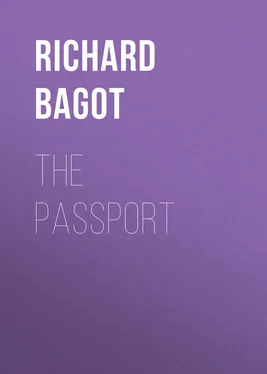Richard Bagot - The Passport
Здесь есть возможность читать онлайн «Richard Bagot - The Passport» — ознакомительный отрывок электронной книги совершенно бесплатно, а после прочтения отрывка купить полную версию. В некоторых случаях можно слушать аудио, скачать через торрент в формате fb2 и присутствует краткое содержание. Жанр: foreign_antique, foreign_prose, на английском языке. Описание произведения, (предисловие) а так же отзывы посетителей доступны на портале библиотеки ЛибКат.
- Название:The Passport
- Автор:
- Жанр:
- Год:неизвестен
- ISBN:нет данных
- Рейтинг книги:4 / 5. Голосов: 1
-
Избранное:Добавить в избранное
- Отзывы:
-
Ваша оценка:
- 80
- 1
- 2
- 3
- 4
- 5
The Passport: краткое содержание, описание и аннотация
Предлагаем к чтению аннотацию, описание, краткое содержание или предисловие (зависит от того, что написал сам автор книги «The Passport»). Если вы не нашли необходимую информацию о книге — напишите в комментариях, мы постараемся отыскать её.
The Passport — читать онлайн ознакомительный отрывок
Ниже представлен текст книги, разбитый по страницам. Система сохранения места последней прочитанной страницы, позволяет с удобством читать онлайн бесплатно книгу «The Passport», без необходимости каждый раз заново искать на чём Вы остановились. Поставьте закладку, и сможете в любой момент перейти на страницу, на которой закончили чтение.
Интервал:
Закладка:
Some people in Rome said that the deceased Montefiano was bored and prayed to death by his pious wife and the priests with whom she surrounded him. These, however, were chiefly the boon companions of the prince's unregenerate days, whose constitutions were presumably stronger than his had proved itself to be.
Rome – respectable Rome – was edified at the ending that the Prince of Montefiano had made, at the piety of his widow, and also at the fact that there was more money in the Montefiano coffers than anybody had suspected could be the case.
The portion left to the widowed princess was, if not large, at least considerably larger than had been anticipated even by those who believed that they knew the state of her husband's affairs better than their neighbors; and by the time Donna Bianca should be of an age to marry, her fortune would, or should, be worth the attention of any husband, let alone the fiefs and titles she would bring into that husband's family.
The Princess of Montefiano, since her widowhood, had continued to live quietly on the first floor of the gloomy old palace behind the Piazza Campitelli, in Rome, which had belonged to the family from the sixteenth century. The months of August, September, and October she and her step-daughter usually spent at a villa near Velletri, but except for this brief period Rome was their only habitation. The princess went little into the world, even into that of the "black" society, and it was generally understood that she occupied herself with good works. Indeed, those who professed to know her intimately declared that had it not been for the sense of her duty towards her husband's little girl, she would have long ago retired into a convent, and would certainly do so when Donna Bianca married.
In the mean time, the great, square building, with its Renaissance façade which dominated the little town of Montefiano, remained unvisited by its possessors, and occupied only by the agent and his family, who lived in a vast apartment on the ground-floor of the palace. The agent collected the rents and forwarded them to the princess's man of business in Rome, and to the good people of Montefiano the saints and the angels were personalities far more realizable than were the owners of the soil on which they labored.
Not that Don Agostino knew the princess any better than did his parishioners. He always insisted that he had never seen her. His attitude, indeed, had been a perpetual cause of surprise to the agent, who, when Don Agostino first came to the place, had not unreasonably supposed that whenever the priest went to Rome, which he did at long intervals, becoming ever longer as time went on, one of his first objects would be to present himself at the Palazzo Acorari.
Apparently, however, Don Agostino did not deem it necessary to know the princess or Donna Bianca personally. Possibly he considered that so long as his formal letters to the princess on behalf of his flock in times of distress or sickness met with a satisfactory response, there was no reason to obtrude himself individually on their notice. This, at least, was the conclusion that the agent and the official classes of Montefiano arrived at. As to the humbler members of Don Agostino's flock, they did not trouble themselves to draw any conclusions except the most satisfactory one involved in the knowledge that, as the Madonna and the saints stood between them and Domeneddio without their being personally acquainted with him, so Don Agostino stood between them and the excellencies in Rome, who, of course, could not spare the time to visit so distant a place as Montefiano.
II
Don Agostino, his office completed, closed his breviary and stood gazing across the plain below to where Rome lay. On a clear day, and almost always in the early mornings in summer, the cupola of St. Peter's could be seen from Montefiano, hung, as it were, midway between earth and heaven; but now only a low-lying curtain of haze marked the position of the city. Down in the valley, winding between low cliffs clothed with brushwood and stunted oaks, the waters of the Tiber flashed in the slanting sun-rays, and the bold outline of Soracte rose in the blue distance, like an island floating upon a summer sea.
And Don Agostino stood and gazed, and as he did so he thought of the restless life forever seething in the far-off city he knew so well – the busy brains that were working, calculating, intriguing in the shadow of that mighty dome which bore the emblem of self-sacrifice and humility on its summit, and of all the good and all the evil that was being wrought beneath that purple patch of mist that hid – Rome.
None knew the good and the evil better than he, and the mysterious way in which the one sprang from the other in a never-ending circle, as it had sprung now for wellnigh twenty centuries – ever since the old gods began to wear halos and to be called saints.
Don Agostino, or, to give him his proper name and ecclesiastical rank, Monsignor Lelli, had been a canon of the basilica of Santa Maria Maggiore, in Rome, before he fell into disgrace at the Vatican.
Notwithstanding the gossip which had been rife concerning the reasons for his exile from Rome to Montefiano, private morals had had nothing to do with the matter. For several years he had filled a post of some confidence at the Vatican – a post, like that held by Judas Iscariot, involving considerable financial responsibility.
Judas Iscariot, however, had been more fortunate than Monsignor Lelli, inasmuch as he was attached to the financial service of Christ, and not to that of Christ's vicar.
To make a long story short, certain loans, advanced for political purposes, though private social interests were not extraneous to the transactions, lightened the money-bags to an unforeseen extent, and the securities which Monsignor Lelli held in their stead soon proved to be little better than waste paper. It was known that Monsignor Lelli had acted under protest, and, moreover, that he had obeyed instructions which he had no choice but to obey.
The Vatican, however, differs in no way from any other organization to carry on which the rules of discipline must be strictly maintained; and when a superior officer blunders, a subordinate must, if possible, be found to bear the blame. In this case Monsignor Lelli was manifestly the fit and proper scape-goat; and here all comparison with Judas Iscariot ended, for he had walked off with his burden to Montefiano without uttering so much as a protesting bleat.
But at Rome the true motives for actions both public and private are rarely to be discovered on the surface. Nominally, Monsignor Lelli's disgrace was the direct consequence of his negligence in safeguarding the sums of money for the sound investment of which he was supposed to be responsible. Practically, its cause lay elsewhere. He was known to be a Liberal in his political views, the friend of a prominent foreign cardinal resident in Rome, to whose influence, indeed, he owed his canonry of Santa Maria Maggiore, and whose attitude towards the Italian government, and also towards various dogmatic questions, had for some time aroused the ill-will of a pontiff who was even more anti-Italian than his predecessor. Unfortunately for himself, Monsignor Lelli had published his views on the relations between Church and State, and had drawn down upon his head the wrath of the clerical party in consequence. His enemies, and they were many, left no means untried to bring about his disgrace, fully aware that by doing so they would at the same time be striking a blow at the obnoxious cardinal who supported not only Monsignor Lelli but also every Liberal ecclesiastic in Rome. When it became evident that more than one grave financial blunder had been committed by others in authority, it was equally obvious that the moment to strike this blow had arrived, and it was delivered accordingly.
Читать дальшеИнтервал:
Закладка:
Похожие книги на «The Passport»
Представляем Вашему вниманию похожие книги на «The Passport» списком для выбора. Мы отобрали схожую по названию и смыслу литературу в надежде предоставить читателям больше вариантов отыскать новые, интересные, ещё непрочитанные произведения.
Обсуждение, отзывы о книге «The Passport» и просто собственные мнения читателей. Оставьте ваши комментарии, напишите, что Вы думаете о произведении, его смысле или главных героях. Укажите что конкретно понравилось, а что нет, и почему Вы так считаете.












